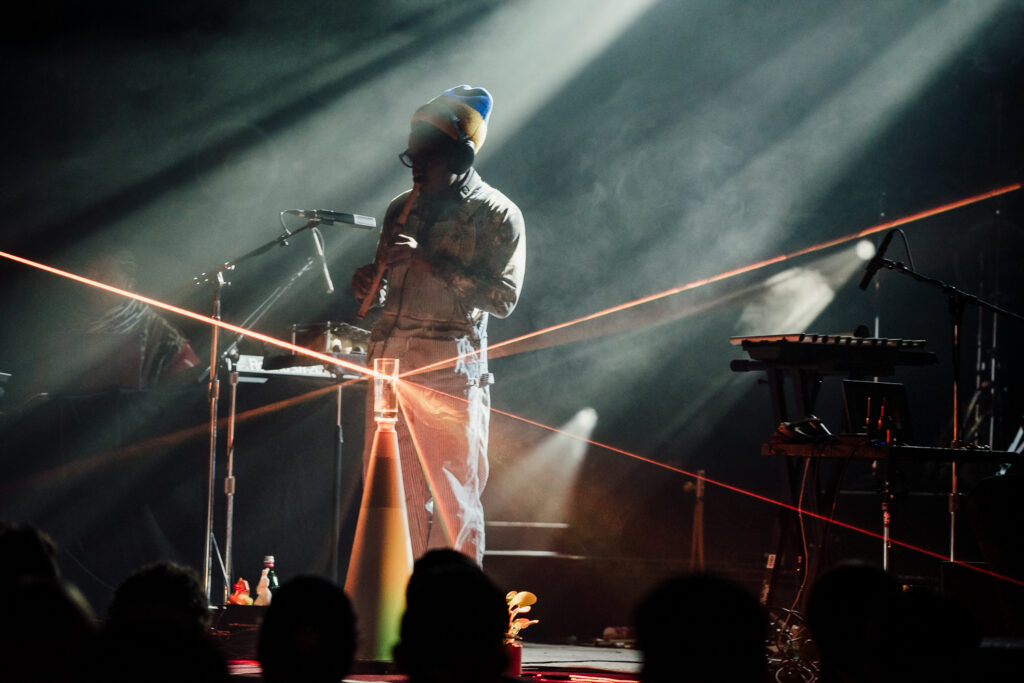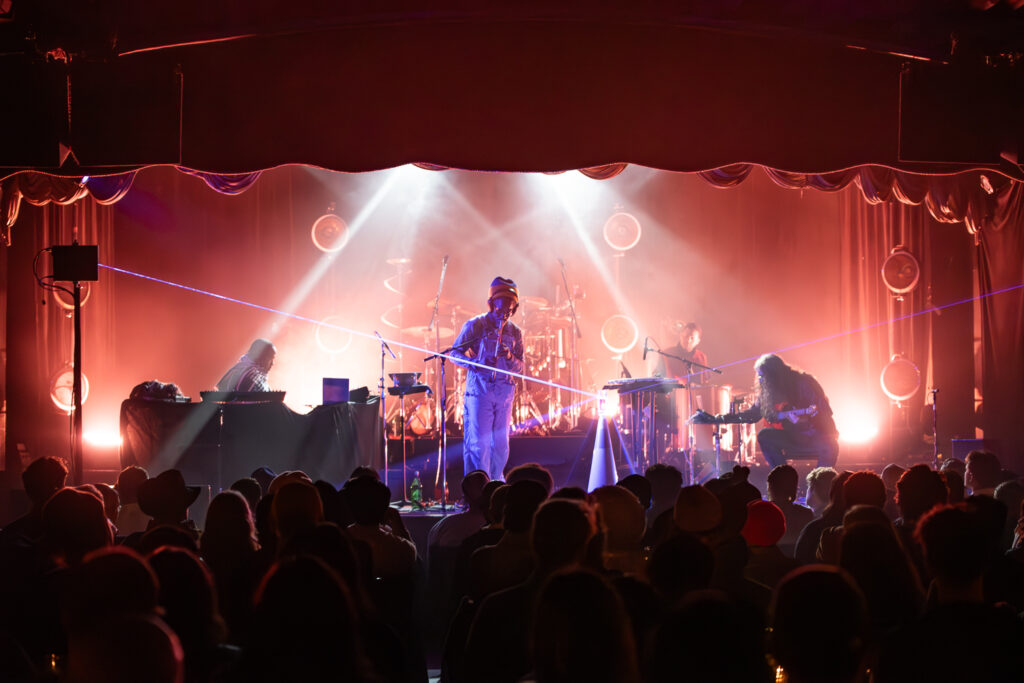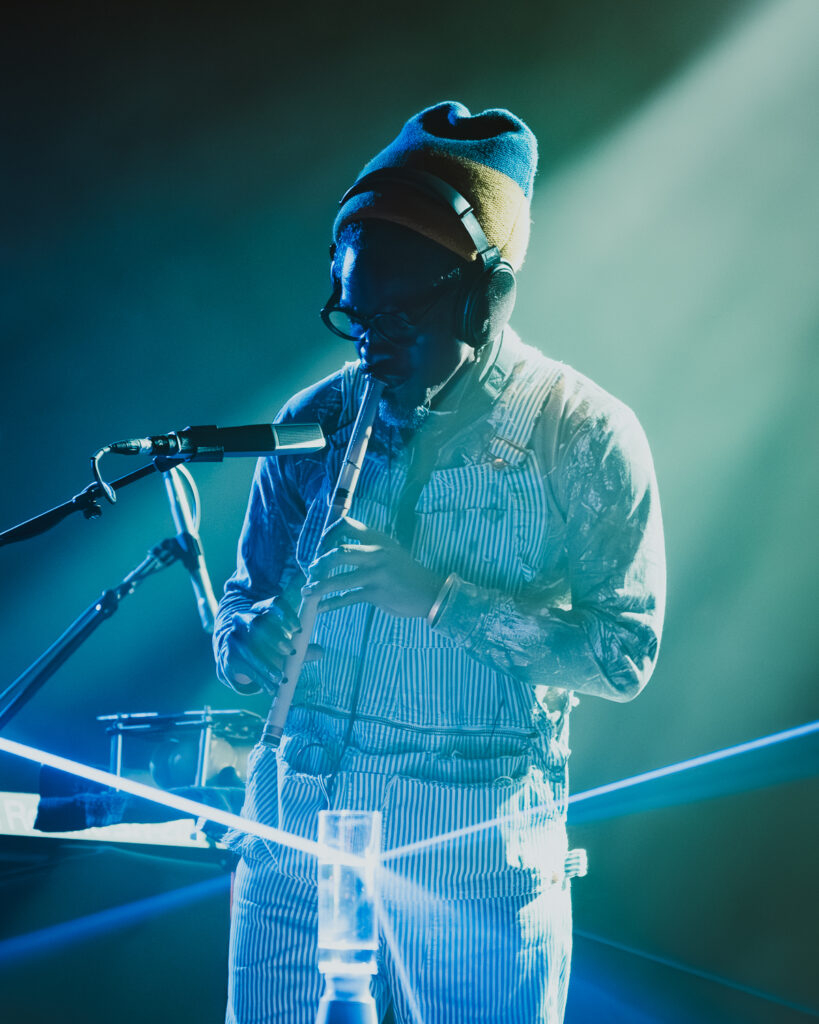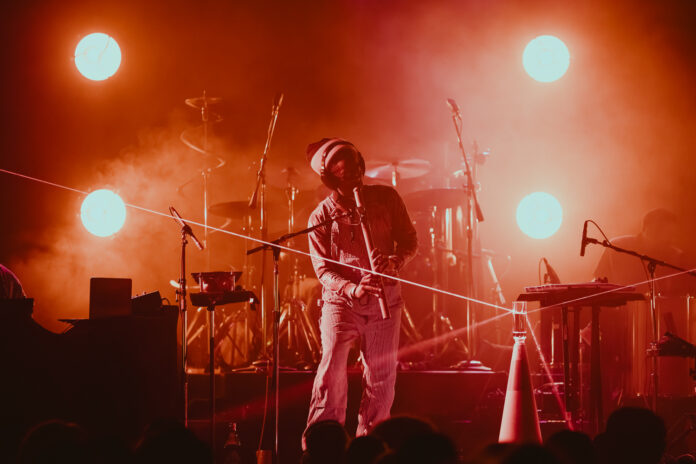During the first of five live performances in the Bay Area at Bimbo’s 365 Club in San Francisco on Feb. 20, André “3000” Benjamin appeared to be warm, funny, relaxed, and happy to be sharing the current music that makes him feel good. He has a real history with the Bay and it was his first concert here since appearing with his friend and Outkast partner Antwan “Big Boi” Patton at the Treasure Island Music Festival in 2004.
However, he’s not rapping his hits on this tour—he’s improvising with his friends Carlos Niño, Nate Mercereau, Surya Botofasina, and Deantoni Parks. As he explained to the Bimbo’s patrons, their practice is based not only on his/their recent, flute-forward, ambient-ish, jazz-ish album New Blue Sun, but the energy given to them from the crowd in that moment.
“I don’t know chords, I don’t know notes, or things like that,” he said, but his friends provide the “perfect bed to fly free.”
Tuesday’s show was an intimate seated event, with candlelit tables that were first come, first served. Everyone who lined up at least two hours before the doors opened got a shot at a spot right up front. The Cool!naria truck was parked out front for those who wanted to pregame with tacos or tortas. Others discussed the sky-high prices of concerts these days, or the good timing of psychedelics taken before arriving at the venue.

Once inside, our phones were locked up in those annoying puffy pouches. Though this is increasingly more common, the last time I encountered this security measure was during a visit to the late Prince’s estate, Paisley Park. Prince’s last shows in Oakland were also the last time I spent way over face value on a resale ticket just to be in the room. There are no regrets doing that with Mr. Nelson, and no regrets doing the same with Mr. Benjamin.
I wasn’t the only one in the crowd who thinks of a natural lineage there, by the way. On Tuesday, a pleased audience member yelled Prince’s happy exclamation noise that appeared often in songs at André: “Ouwa!”
A small houseplant and a drinking glass were set on stage along with several flutes that were custom made for André. We were all super quiet for the opening moments, and then he broke the fourth wall and started talking to us. With us! He shared that we were being recorded and “sampled,” and gave us permission to make noise, not only by clapping at that particular moment, but by making noise whenever we wanted during the show. On cue, a baby cooed.
“Like the baby!” he said.

Most people still kept it under control, for the most part, though there were some “I love yous” which he returned, and I personally couldn’t resist flicking a lighter during a peak moment. Someone at a table right in front threw André peace signs, headbanged, and did a bouncing knee boogie, all while masked in their seat. It was glorious.
He was personable and hilarious as he shared how he never expected to be playing flutes on stage, but it grew out of the social media phenomenon of people catching him walking around Los Angeles or other cities playing one of his flutes. Some people knew who he was, but many didn’t—they just thought they were encountering a busker with something extraordinary about him.
Instead of people “catching me bullshitting” at Starbucks or on a walk, this album is something he is sharing with the world. This is only the third week they have played in front of people, he said, and it’s feeling good and growing.
After almost two hours of instrumental vibes, he started doing something vocal. But what? I wasn’t sure at first? Was it another language, or speaking in tongues?
“Everybody here tonight, I just wanna let you know sincerely that I just made that all up! It’s called Quico,” he said, spelling it out. According to Rolling Stone, he explained at the tour’s first show in Brooklyn that he used to speak Quico with his late mother.
While introducing the players, André talked about meeting Carlos Niño at the Insta-famous designer grocery store Erewhon in Venice Beach, where he lives, and not knowing the resumes of the players he’d soon work with—like that Nate Mercereau, who he calls “Sample Jesus,” made a duet with the Golden Gate Bridge. Wearing a blue and gold knit hat, he also revealed that, before he moved to Venice, he was considering Berkeley. He also admitted that, as a kid, he wanted to be from California, because we use words like rad.

While we’d welcome him to the Bay Area any time, this entire project wouldn’t have happened unless he was shopping at the $20 celebrity smoothie store in Southern California. By the way, merch prices at the show were Erewhon or rap show level: $60 t-shirts, including one that says, “Listen to Sade,” and $120 hoodies. I still got a shirt and will be proud to rep this direction of André 3000’s art.
I sat in a second row table in his direct field of vision, and at one point, I really thought he was fluting straight into my soul and making direct, unwavering eye contact with me. The lights were too dim to know for sure, but let’s just go with this version.
And then, I thought he said (to me only), “Let’s go!”
After the show, one of my friends asked, “Did you hear him say San Francisco?”
The sold-out run of Bay Area shows continues Thu/22 at Bimbo’s, Sat/24 at The Independent in San Francisco (with two shows), and Mon/19 at Cornerstone in Berkeley.
Before André 3000 wished us a good night on Tuesday, he asked the Bimbo’s audience to say on the count of three, “We love you, Big Boi!”
Join Tamara’s Music Book Club and 48 Hills on March 31 at noon Pacific Time on Zoom for a conversation with America’s brilliant Outkast scholar and professor Dr. Regina N. Bradley, author of Chronicling Stankonia: The Rise of the Hip-Hop South and editor of An Outkast Reader: Essays on Race, Gender, and the Postmodern South. The Zoom link will be posted that week on the events page.





